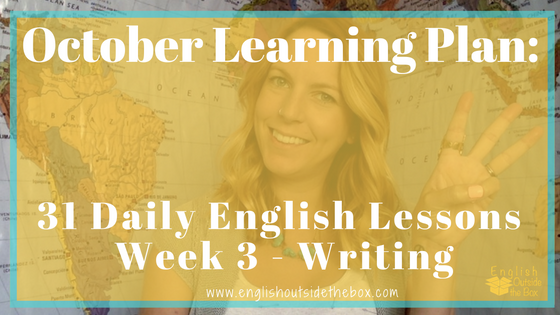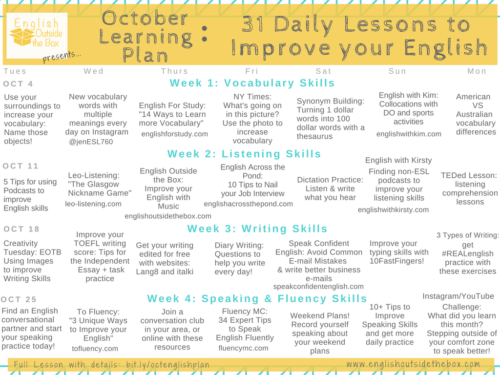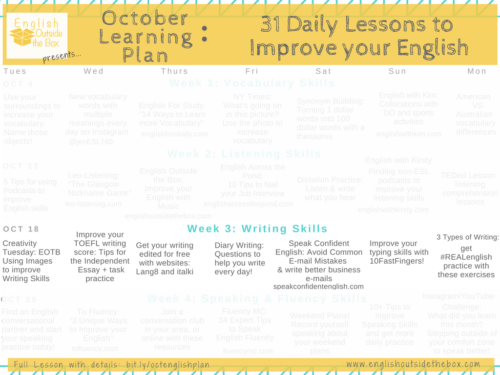
October Learning Plan: 31 Daily English Lessons – Week 3 Writing
Writing skills are incredibly important when learning English, because you’ll use these skills to communicate both formally and informally. You’ll need writing skills to communicate with friends in other cities via messages, e-mails, Whatsapp, etc; if you are going to use English professionally, you’ll need to know more formal styles of writing, like e-mails and memos; and if you’re planning on going to a university or taking the TOEFL, you’ll need essay writing skills as well. Don’t worry, I have you covered (*I can help/will provide you with what is needed*), because this week of your October Learning Plan will help you with your English writing fluency, and help you improve these skills.
We’re already on week 3 of your October Learning Plan, but remember it’s never too late to review the previous 2 weeks and their lessons. If you don’t know what the October Learning Plan is, then check out the image below to see everything that you can learn this month! I created this plan to give you 31 daily English activities all month to help you improve your vocabulary, listening, writing, and speaking skills. Throughout the month, you will receive tips from various English teachers, get access to many English lessons and get ideas on new ways to continue self-studying. Sounds good, right?
If you haven’t seen or started the first 2 weeks, then you can watch and read those blog + video lessons here:
As usual, I want you to begin this lesson by watching the audio portion to practice listening skills. You’ll hear a summary of this week’s activities and some details about how to complete each day’s task. However, continue reading for the necessary links, resources and further explanations for each day.
Week 3: Writing Fluency
Day 1: October 18
Creativity Tuesday: Using Images to Improve Writing Skills
Creativity Tuesday hopes to inspire your creative side through beautiful photography and art. Using these photographs will give you an opportunity to practice and improve your writing skills, specifically your creative writing skills. Using the photo provided, allow your mind to wander freely as you decide what to write. I’ll provide you with some questions to guide your thinking process if you get stuck; however, the object of the post is to get you thinking….outside the box. Today, I’ll share one picture; however, there are actually 5 different tasks you can complete with creativity Tuesday, and you can access them all and choose your favorite picture by clicking here.

Describe what you see happening in this photo. You can explore the idea of opposites (black/white, light/dark, classic/modern, simple/complex).
The caption from the photographer’s Instagram is, “Release”. How would you explain this caption?
What would your caption be for the photo, and why?
Where do you think this photo was taken? Use as many details from the photo as you can to make an inference (*a conclusion based on evidence*)
Why are they (the artist and model) in the street? Why is she barefoot? Elaborate (*give detail*) as to why this might be a rare/unique thing to see walking down the street, and why the artist may have chosen this environment.
*If you want to read a little more about writing stylistics, check out this article here: Writing Stylistics
Day 2: October 19
Improve your TOEFL Writing Score: Tips for the Independent Essay
(click the title above [in yellow] to read the full lesson)
Are you preparing for the TOEFL test? Do you need some tips for the Independent essay? Today’s task will help you understand how to outline your independent essay. This is not useful for just the TOEFL, this type of planning is also helpful in your college class or anywhere you need to write a personal essay.
This blog + video lesson will give you a sample prompt, example outline, and get you started with writing a high scoring essay!
Day 3: October 20
Get your Writing Edited and Reviewed
You’ve already written 2 pieces of text this week, and you have a few more you are going to write as the week continues. So, how do you know if you’re writing accurately? How can you check your grammatical structures, spelling, grammar, etc…?
I am delighted to share with you 2 resources to get your writing edited (and for absolutely free!). The first resource is Lang-8.com, which is similar to a conversational language exchange website, but for writing! Connect with a native speaker to have your writing edited! It’s that easy! The next resource is on italki.com On italki you can join and use the “notebook” feature under “community” to post your writing. Others, mostly native speakers, can edit and give you feedback on your writing.
Additionally, before you even begin writing, you can consider downloading/installing Grammarly on your computer. Grammarly is 1000 times better than the regular “grammar and spell checker” on your word program. Grammarly helps catch grammar mistakes, including poor vocabulary usage and spelling. The best part, it even has some explanation as to why the mistake is wrong, so you can learn, too! This tool comes very highly recommended.
Day 4: October 21
Diary Writing: Questions to Help you Write Every Day
The more you practice something, the better you get….and faster, right? So if you want to improve your writing skills quickly, then you should be writing every day. What should you write about? Use these question prompts below to help you write in a daily diary. A diary is an informal record of your experience and thoughts, and you can use it to practice new vocabulary (especially words you learned in week 1!), practice different grammar points, and review different grammar/sentence structures.
Questions to answer in your writing journal/diary:
What did you do today? What are you going to do tomorrow? What was the highlight of your week last week? Did anything scary happen last month? Do you have any upcoming vacations? How are you feeling at work/school? Who is the last person you spent time with and what did you do? What’s the most memorable thing you’ve eaten? What’s something on your bucket list? Do you have any regrets; if so, what would you have done differently? If you won the lottery tomorrow, what would you do? Who is the most influential person in your life, why? What is your biggest fear related to English? What is your next goal and how will you accomplish it? How do you overcome personal obstacles? What’s the last obstacle you overcame?
Day 5: October 22
Speak Confident English: Avoid these Common Email Mistakes
(click the title above [in yellow] to read the full lesson)
Connect with Anne-Marie from Speak Confident English today. She helps professional women improve their fluency and be more confident with English. Today’s lesson will help you with your business English skills, and you’ll start writing better e-mails.
She has a video + blog lesson with examples to get you started, so click the link above and start day 5’s lesson now.
Day 6: October 23
(click the title above [in yellow] to read the full lesson)
With the growing popularity and use of technology and computers, it’s absolutely essential that you are able to type (and type well) in English with an English (language) keyboard. If you are able to type quickly, it can help you with exams and tests, get you a better job, and even help you be more efficient (*capable*) in your day-to-day computer tasks. These tasks may even include silly things like Facebook and Twitter.
Today’s lesson connects you with 10fastfingers.com, where you’ll have 5 different activities you can complete to check and practice your typing skills. You can complete the test to see how you are today (don’t forget to try it again later to check your progress), compete with others for some fun, and copy text to work on improving your current skills. It’s a fun and interactive way to type better so I hope you enjoy the lesson.
Day 7: October 24
3 Types of Writing: Get #REALenglish Practice
We’ve already talked about academic English writing (essays), professional business writing (emails), and some casual writing (diary entries). However, there are other types of writing that can be both formal and informal that you should be confident with. These types are:
- letters
- invitations
- news stories
1) For letters, first you must identify the audience, who is receiving this letter? It is a personal letter if it’s going to a friend or family member, and it’s a business letter if you’re sending it to a boss, colleagues, a business person you’re not familiar with, or some other professional industry. Knowing your audience will help you set the tone. Next, what’s the purpose of the letter? This will help you with the content, and knowing what to write. For personal letters, you’re probably exchanging information or telling a story. For a business letter you’re probably asking for or providing information about a business or product.
You can start personal letters with:
Dear ____(name),
____(name),
Hello/Hey/Hi _____ (name),
Business letters should start with:
Dear ___ (name or company),
To whom it may concern, (if the name/company is unknown)
Your tasks: Write a letter to a friend telling them about your plans for English, and what you have been doing to study/practice. Talk about your goals and what you have enjoyed learning. Next write a letter to a travel agency, requesting information about a trip to your dream city. Make sure to ask about prices, accommodations, activities included, and the dates of travel.
2) For invitations, you’ll also need to know who the audience and what the purpose is. Are you inviting friends or family to a party, or a boss to a business dinner? Is the invitation going to a single person or a group of people? If the letter is going to a single person, you can follow the pattern of the “letter” written above. However, when writing to a group of people it’s important to include the WHO, WHAT, WHY, WHEN, and WHERE. The language will be short, often with passive tense sentences. Each of these points should have it’s own line on the invitation. See an example here of an informal/friendly invitation.
Your task: Write an invitation to a group of friends for your “going away party.” Imagine you are going to the U.S. to live abroad for 1 year and you want to celebrate with friends. Make sure to include all of the relevant details.
3) You may not write news stories often, but you could quite possibly for a class or in another situation. So let’s practice! Review the structure here.
Your task: Write a news story about something interesting that happened to you recently, or something you saw happen. If you can’t think of anything, think about your favorite movie and write a news story about something that happened in the movie.
Don’t forget, you can get all of your writing tasks edited on the websites listed on day 3. If you want to connect with me for writing edits, corrections, and feedback, then send me an e-mail. Click “contact” above.
Congratulations on finishing another week of your October Learning Plan! I am proud of your hard work and dedication!
Don’t stop learning now, make sure you save these websites and resources to continue practicing..
About the Guest Author:

Anne-Marie loves helping professional women who are non-native English speakers become confident and fluent in English. That’s why she created, Speak Confident English, which is specifically designed for professional women who are non-native English speakers with strong skills but who need to improve English-speaking abilities, grow in fluency and, most importantly, be confident in English. Training opportunities include free online lessons, one-on-one classes, and the 4-week intensive Fluency School course.
Did you enjoy this week’s October Learning Plan activities and lessons? Please share this lesson with a friend or a colleague!
You can still access Week 1 here, Week 2 here, and come back next week for [your final] week 4!
Happy Studying ♥
This post contains affiliate links for italki and Grammarly.
The Conversation Club will provide you with 6 group conversation calls to practice with a real teacher and a group message community to connect with other members.
You will also get weekly English lessons to help your vocabulary, listening, reading, pronunciation, and more!
Try the Club for 1 week, free! Join the 1-week free trial here.


